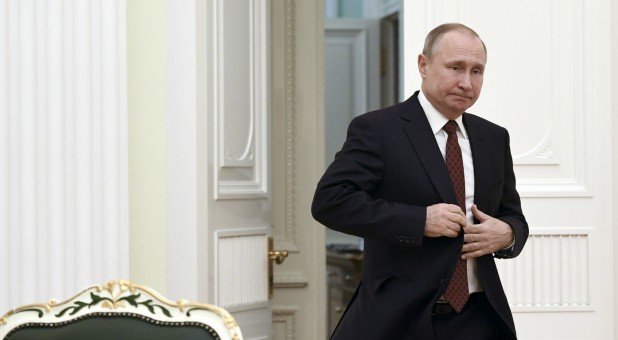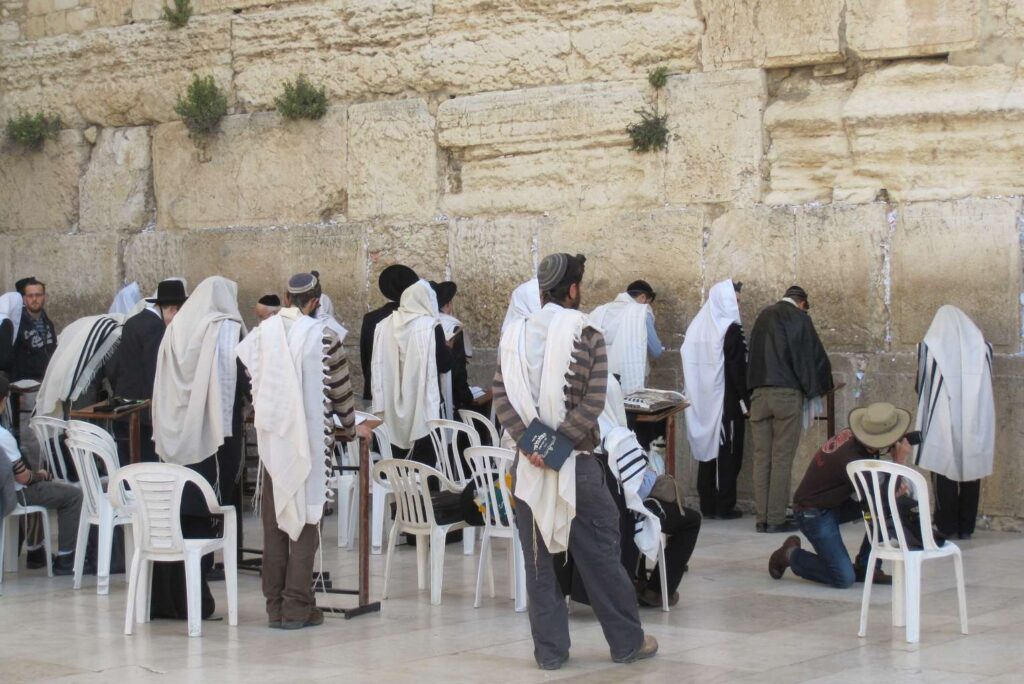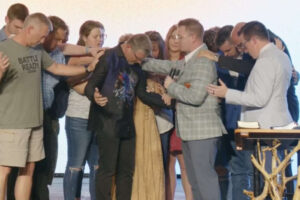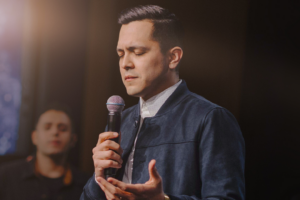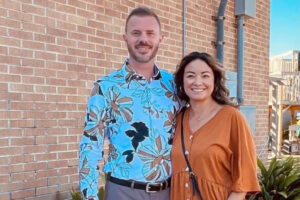Unsurprisingly, Vladimir Putin has won Sunday’s so-called “election” for his fourth term as president of Russia. That puts him on course to further entrench his power, pursue an expansive foreign policy and continue his escalating showdown with the West. However, one of his most significant goals to enhance his stature may be one that has thus far fallen under the radar: the development of a post-Soviet ideology for his country.
Since he came to power in 1999, Putin has defined and become synonymous with modern Russia. By the end of his fourth presidential term in 2024 (including his stint as prime minister in 2008-2012), Putin will have ruled Russia for longer than any other Russian or Soviet leader besides Stalin. Back in 2014, First Deputy Head of the Presidential Administration, Vyacheslav Volodin, stated “If there’s Putin – there’s Russia, if there’s no Putin – there’s no Russia.”
Putin would want nothing more than the West and the Russian population to agree. While Russia is broad and diverse, the country has become hostage to Putin’s persona and his emergent ideology. This presents a crisis of identity. For a country that desires the status of a great power and civilization rather than that of Putin’s personal fiefdom, Russia requires a mission statement – an ideology offering a distinct worldview.
Putin needs this “raison d’être” not only as a distraction from Russia’s stagnating economy, but also to provide a legacy that offers an alternative to the Western model of liberal democracy. And while many of his recent actions may have appeared impulsive, his inner circle has increasingly provided the contours of a nascent national philosophy.
Developing an ideology may seem an unlikely preoccupation for a popular autocratic regime that is not afraid to flex its military muscle and rattle its nuclear saber. However, defining its vision of itself is an important existential task for a country where modern statehood is still novel and which has only recently emerged from policy goals based on Soviet-era Marxism-Leninism. Branding itself is even more crucial for a country that seeks to play a grand global role but is unwilling to accept Western norms of legitimacy for domestic governance and for international diplomacy.
What could serve as the basis of Russia’s new ideology? In the early years of his administration, Putin promised the Russian public prosperity and stability. But as Russia’s economy failed to diversify and became ever more dependent on natural resource exports, as corruption became more entrenched, and most importantly as oil prices started falling in 2014, that message of prosperity sounds increasingly hollow.
In recent years, several distinct themes have emerged from the Kremlin: sovereignty, conservatism, orthodoxy, and a messianic drive for great power status. Sovereignty became the Kremlin’s watchword following NATO’s intervention in Kosovo in 1999. Putin’s more notable recent appeals to national sovereignty came in a 2013 op-ed in The New York Times, in which he made the case for using international law to counter America’s unilateral intervention in Syria. Since then Moscow has emphasized inalienable “national sovereignty” that gives states full authority over their territories in contrast to the American or European notion of a government’s limited sovereignty. Putin’s column, together with Moscow’s decision to grant asylum to American whistleblower Edward Snowden the same year, marked the start of Moscow’s efforts to present itself as a moral global actor countering, especially, the United States.
Indeed, much of the emerging ideology defines itself more by what it’s against than what it’s for: anti-American, anti-West, anti-liberalism, anti-globalization, anti-cosmopolitanism and anti-progressive. In many of his speeches Putin cites Ivan Ilyin, a Russian philosopher who warned in a 1950s essay that terms like democratization, liberalization and freedom were tools for destroying the unity and Eurasian spirit of the Russian civilization.
Social conservatism, or so-called “Christian values” as espoused by the Russian Orthodox Church, are additional building blocks of Russia’s new ideology. “Many Euro-Atlantic countries have moved away from their roots, including Christian values,” Putin said in 2014, “… This is the path to degradation.” With only 15 to 20 percent of the Russia’s 142 million people estimated to be practicing members of the Russian Orthodox Church and given the country’s atheist Soviet traditions, it is surprising that the church has emerged as one of the most significant shapers of the new Russian national identity. In practice this has resulted in a series of domestic laws outlawing blasphemy, so-called gay propaganda, and decriminalization of domestic violence.
Russia’s desire for great power status is tied to its perceived messianic mission. Here one key concept is the Russian World (Russkiy Mir), which refers to a special spiritual community of at least 35-million Russian speakers outside the Federation, such as in the former Soviet republics of Georgia, Moldova and Ukraine.
In the Kremlin’s vision, these Russian compatriots see Putin as a new “gatherer of the Russian lands” in the tradition of Ivan the Great, who tripled the territory of Muscovy in the late 15th century. Indeed the parallels between contemporary Russian foreign policy and its formerly imperial doctrine are striking. Russkiy Mir is a modern alternative to the territorial ambitions of the Soviet Union or the Tsarist Empire.
However it is important to recognize that these disparate strands of conservatism, negation of the West and self-aggrandizement fail to form a coherent whole. Ideology is a more complex phenomenon, generally including key elements such as economic theory. While Putin may try to offer an alternative understanding of the world, the Kremlin has not proved capable of providing an attractive alternative to the Western way of life.
Over the next six years, Putin’s government will make an effort to solidify and codify an alternative world view – a view Russia is eager to offer for domestic consumption as well as export. For the Kremlin this vision will represent legitimacy and a patriotic mission statement for the 21st Century. For the West it is important to recognize and to call out the hollowness of this vision, rather than falling into the trap of accepting it as a justification for this regime. The West won the Cold War because it won the competition for ideas and ideals. It will win again if it can overcome the challenges of the fraying relations between a politically-divided United States and a fragmenting Europe to stay firm to a vision and mission that is more positive than whatever Putin devises in his latest term of office. {eoa}
Agnia Grigas is a senior fellow at the Atlantic Council.
© 2018 Thomson Reuters. All rights reserved.
See an error in this article?
To contact us or to submit an article



